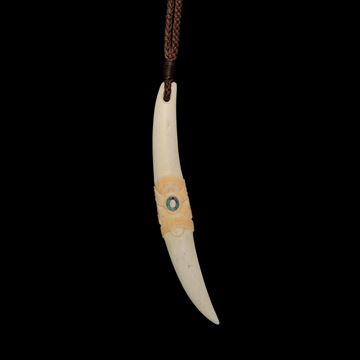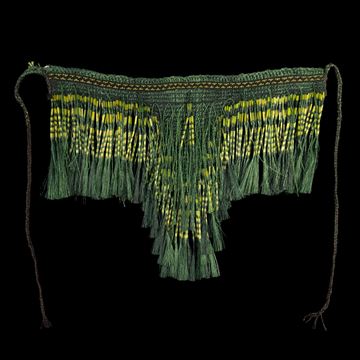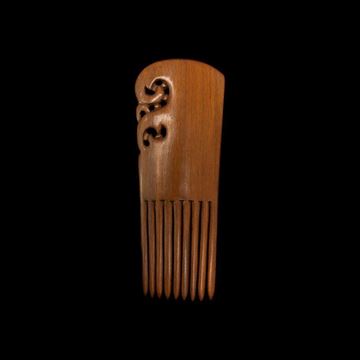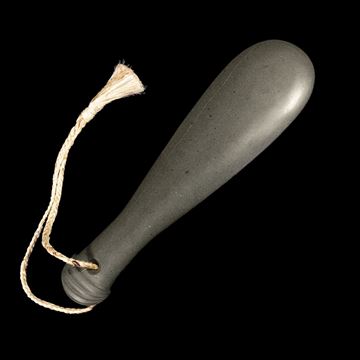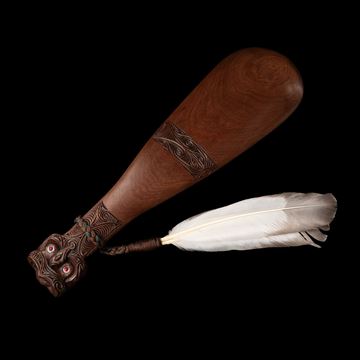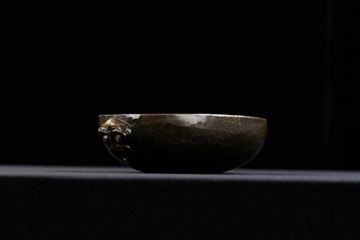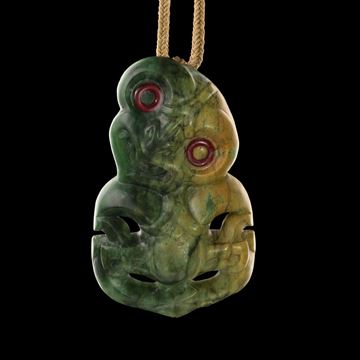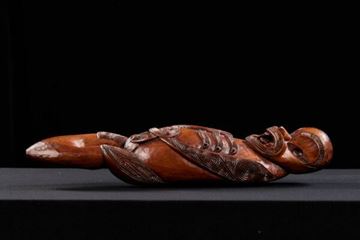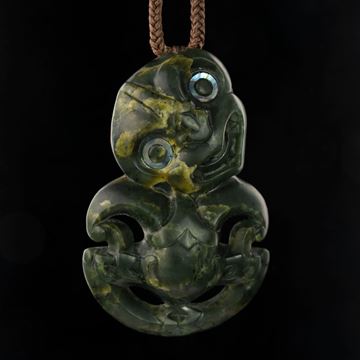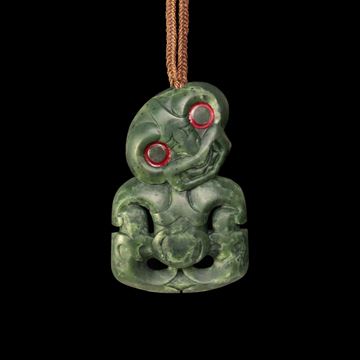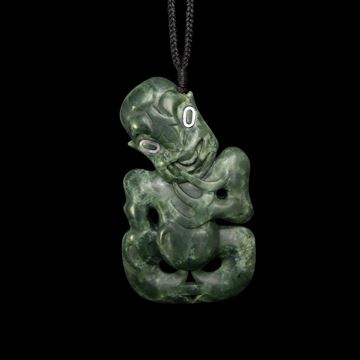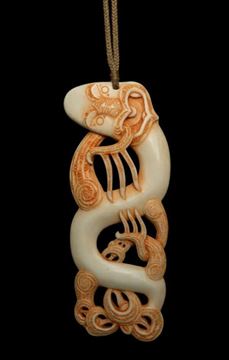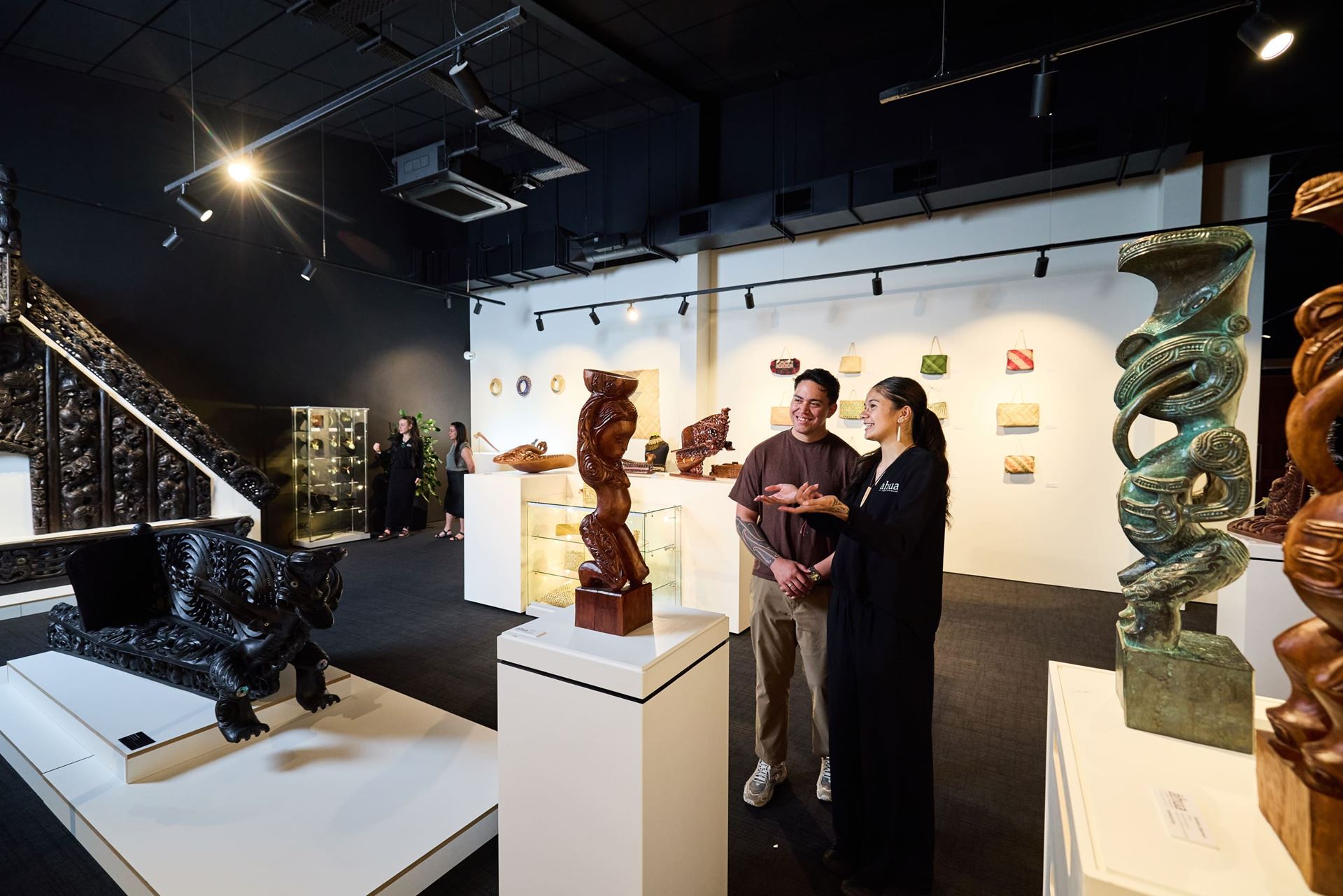
Āhua Gallery
Select Subcategory
Aurei Koruru - 5441KH
Aurei were customarily used as a pin for fastening cloaks and may be made from bone, stone, wood or shell. They may also have been worn through the ear as an earring or around the neck as a pendant. Aurei are still commonly worn as pendants and earrings and as with most Māori personal adornments, are often passed down generationally.
Material: Koiwi (Beef Bone)
Measurements: 124mm x 18mm x 10mm
$1,250.00
Maro - 4905TE
The maro is a frontal apron tied around the waist and is a traditional garment that is worn by both men and woman. This maro has been fashioned with strands of muka fibre within the flax.
Material: Harakeke & Muka
Measurements: 680mm x 480mm
$1,395.00
Heru - 4958CF
Heru were produced in varying shapes and sizes and were made from rākau (wood) and in some instance’s parāoa (whalebone). These combs were highly valued as personal heirlooms and were consequently passed down from one generation to the next, often acquiring their own personal names.
The combs were mostly decorative and held the pūtikitiki (top knot) in place. When a comb was broken, it was placed in a swamp or a sacred place for safe keeping because the head was the most sacred part of the body and therefore tapu (sacred).
Material: Tōtara
Measurements: 230mm x 90mm x 4mm
$2,100.00
Patu Onewa - 6721PD
Patu (meaning to strike or hit) were typically fashioned from native hardwood, whalebone or stone, including our highly valued pounamu (greenstone). Patu were often sharp at their forward edge and were used with thrusting, jabbing and swinging blows.
Māori weapons are notable for their fine sculptural form and were designed for close hand-to-hand combat. No other stone-age war implements surpassed them in deadly effectiveness.
Material: Onewa (NZ Greywacke)
Measurements: 380mm x 100mm
$2,190.00
Patu - 4797TA
Patu (meaning to strike or hit) were typically fashioned from native hardwood, whalebone, or stone, including our highly valued pounamu (greenstone). Patu were often sharp at their forward edge and were used with thrusting, jabbing, and swinging blows.
Material: Rātā (NZ Native)
Measurements: 360mm x 100mm
$2,200.00
Hei Tiki - 6820HW
Hei tiki are the best known of all Māori adornments. Tiki are symbols of fertility that depict a new-born child. They are often family heirlooms bearing personal names and embodying their wearers lineage. As with most Māori personal adornments, hei tiki are often passed down generationally.
Material: Pounamu (PutiPuti)
Measurements: 95mm x 60mm x 16mm
$2,350.00
Waka Tūpāpaku - CI3348
A waka tūpāpaku is a box used for containing the bones of a person of high rank after they had been exposed on the atamira platform, the flesh removed and the bones anointed with oil and red ochre, placed in a waka tūpāpaku and taken to a tribal buriel cave.
Material: Tōtara
Measurements: 580mm x 140mm x 110mm
$2,500.00
Hei Tiki - 6818HW
Hei tiki are the best known of all Māori adornments. Tiki are symbols of fertility that depict a new-born child. They are often family heirlooms bearing personal names and embodying their wearers lineage. As with most Māori personal adornments, hei tiki are often passed down generationally.
Material: Pounamu (Kawakawa)
Measurements: 116mm x 77mm x 23mm
$2,600.00
Hei Tiki - 6717PD
Hei tiki are the best known of all Māori adornments. Tiki are symbols of fertility that depict a new-born child. They are often family heirlooms bearing personal names and embodying their wearers lineage. As with most Māori personal adornments, hei tiki are often passed down generationally.
Material: Pounamu (Kawakawa)
Measurements: 88mm x 58mm
$2,600.00
Hei Tiki - 6720PD
Hei tiki are the best known of all Māori adornments. Tiki are symbols of fertility that depict a new-born child. They are often family heirlooms bearing personal names and embodying their wearers lineage. As with most Māori personal adornments, hei tiki are often passed down generationally.
Material: Pounamu (Kawakawa)
Measurements: 102mm x 61mm
$2,700.00
Marakihau - 0267UN
Marakihau were believed to harass and prey on shore-living people or sea-travellers. Some were said to be the spirits of departed men, an example being the famed chief Te Tahi, ancestor of the Awa people of Whakatane where a marakihau carving decorates a meeting house.
Material: Koiwi (Beef Bone)
Measurements: 130mm x 50mm
$2,900.00

